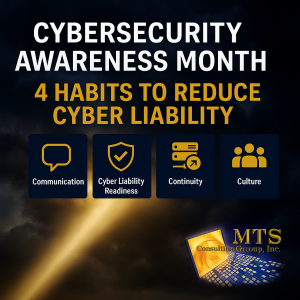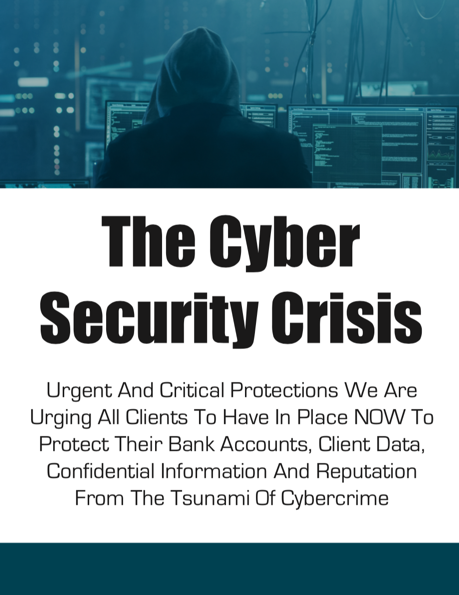
October is Cybersecurity Awareness Month. For most accounting and tax firms, it’s a blip on the calendar. But here’s the hard truth: cyber liability doesn’t wait until you have time for it.
It doesn’t wait for the IRS to ease up. It doesn’t wait for client deadlines to pass. It doesn’t even wait until you’ve had a chance to exhale after another tax season.
Cyber liability hits when you least expect it. And when it does, it doesn’t just take files—it takes time, client trust, and sometimes even the very sense of control you’ve built your career on.
That’s why this month matters. It’s not about doom and gloom. It’s about shining a light—so you can see the hidden exposures, build better habits, and take back the confidence that liability has quietly been stealing.
Here are the four habits I recommend to every firm that wants to not just survive the storm, but prove they’re ready for it.
1. Communication: Don’t Leave Your Team in the Dark
Here’s what I see too often: partners carrying the weight of cyber liability alone, while staff go about their day, unaware of the risks surrounding them.
Then one careless click on a phishing link brings everything down. And the partner feels that sinking, gut-punch moment: “I should have warned them.”
It doesn’t have to be this way.
Make security a living, breathing part of your firm’s conversations. Bring it up in staff meetings. Share alerts about new scams. Thank the person who reports a suspicious email.
The point isn’t to scare people. It’s to empower them. When your team sees that you’re taking cyber liability seriously—and that you trust them to be part of the solution—you turn fear into confidence.
2. Cyber Liability Readiness: More Than Compliance
Most firms think “compliance” is the goal. Check the IRS Pub 4557 box. Nod at the FTC Safeguards Rule. Hope it’s enough.
But here’s the problem: compliance isn’t the finish line. It’s the bare minimum. And when insurers, regulators, and even your clients start asking for proof—screenshots, reports, logs—that bare minimum won’t save you.
This is where the emotional weight shows up. Partners tell me:
- “I feel like I’m always one question away from being exposed.”
- “I can’t sleep before renewals because I know they’ll ask for something I don’t have.”
That’s the hidden cost of cyber liability—living in that uncertainty.
The way out? Build proof into your daily routine:
- Keep MFA and backup reports where you can grab them instantly.
- Make your WISP a playbook, not a binder gathering dust.
- Show your insurer and your clients, without blinking, that you’re already doing the work.
Readiness reduces liability. But even more than that, it reduces the quiet anxiety of not knowing where you stand.
3. Continuity: Protect Your Sanity in Busy Season
Imagine this: it’s March 20th. Every desk in your office is piled high. Then ransomware hits, and suddenly you’re locked out.
It’s not just files at risk—it’s your deadlines, your reputation, your sleep. For three days, you’re living in a storm of calls, panic, and exhaustion.
That’s what continuity protects you from. Not just the technical downtime—but the mental spiral that comes from realizing you’re powerless.
Here’s how you avoid that:
- Test your backups. Don’t just store data—restore it.
- Run a “fire drill” where you practice your recovery steps.
- Prove, to yourself and your carrier, that you can bounce back fast.
Continuity isn’t about technology. It’s about giving yourself permission to breathe, even in the middle of the storm, because you know you can get back up.
4. Culture: Make Security a Shared Win
One of the most defeating feelings for a partner is believing “It all rests on me.”
But here’s the secret: your greatest liability isn’t the technology—it’s the culture. A staff that sees security as “extra” will make mistakes. A staff that feels ownership will save you from them.
Build a culture of shared wins:
- Require MFA and make it normal, not negotiable.
- Celebrate the employee who catches the phishing attempt.
- Encourage the use of password managers instead of sticky notes.
Culture is emotional glue. When security feels like a team effort, not a burden, liability drops—and so does your stress.
 The Deeper Truth
The Deeper Truth
Cybersecurity Awareness Month isn’t about checking boxes. It’s about reclaiming confidence.
Because the real damage of cyber liability isn’t always the ransom or the fine—it’s the quiet, hidden costs:
- The renewal that doubles because you couldn’t prove coverage.
- The March downtime that breaks your rhythm.
- The client who walks away without telling you why.
- The staff who burn out under the weight of uncertainty.
Those costs don’t make headlines, but they can gut a firm. And you don’t deserve to carry them.
Ready to Take Back Control?
This month, don’t just read another article and move on. Take a step that gives you back your footing.
👉 Start with a free Cyber Liability Risk Assessment: https://mtsconsultinggroup.net/riskassessment
In less than an hour, you’ll know:
- Where you’re already strong.
- Where liability is still hiding.
- What to do next to prove you’re ready.
Cyber liability thrives in the dark. Let’s bring it into the light—together.



